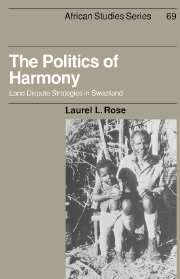Crossref Citations
This Book has been
cited by the following publications. This list is generated based on data provided by Crossref.
Miles, Miranda
and
Crush, Jonathan
1993.
Personal Narratives as Interactive Texts: Collecting and Interpreting Migrant Life-Histories∗.
The Professional Geographer,
Vol. 45,
Issue. 1,
p.
84.
Hackel, Jeffrey D.
1993.
Rural change and nature conservation in Africa: A case study from Swaziland.
Human Ecology,
Vol. 21,
Issue. 3,
p.
295.
McGregor, JoAnn
1994.
People without fathers: Mozambicans in Swaziland 1888–1993.
Journal of Southern African Studies,
Vol. 20,
Issue. 4,
p.
545.
Marquette, Catherine M.
and
Pichón, Francisco
1997.
Survival Strategies among Rural Swazi Households: Historical, Ecological and Social Dimensions.
Forum for Development Studies,
Vol. 24,
Issue. 2,
p.
307.
André, Catherine
and
Platteau, Jean-Philippe
1998.
Land relations under unbearable stress: Rwanda caught in the Malthusian trap.
Journal of Economic Behavior & Organization,
Vol. 34,
Issue. 1,
p.
1.
Gengenbach, Heidi
1998.
‘I'll bury you in the border!’: women's land struggles in post‐war facazisse (Magude district), Mozambique.
Journal of Southern African Studies,
Vol. 24,
Issue. 1,
p.
7.
Fred-Mensah, Ben K.
1999.
Capturing Ambiguities: Communal Conflict Management Alternative in Ghana.
World Development,
Vol. 27,
Issue. 6,
p.
951.
van Donge, Jan Kees
and
Pherani, Levi
1999.
Law and order as a development issue: Land conflicts and the creation of social order in Southern Malawi.
Journal of Development Studies,
Vol. 36,
Issue. 2,
p.
48.
Fred-Mensah, Ben K.
2001.
Indigenous African Conflict Management Schemes: Analyses and References.
A Current Bibliography on African Affairs,
Vol. 32,
Issue. 1,
p.
1.
Kwaku Kyem, Peter A.
2004.
Of Intractable Conflicts and Participatory GIS Applications: The Search for Consensus amidst Competing Claims and Institutional Demands.
Annals of the Association of American Geographers,
Vol. 94,
Issue. 1,
p.
37.
Unruh, Jon D.
2006.
Land Tenure and the “Evidence Landscape” in Developing Countries.
Annals of the Association of American Geographers,
Vol. 96,
Issue. 4,
p.
754.
Claxton, Mervyn
2007.
African Culture: A Source of Solutions for Africa's Problems?.
Présence Africaine,
Vol. N° 175-176-177,
Issue. 1,
p.
589.
Karlberg, Michael
2012.
Forming a Culture of Peace.
p.
15.
Golomski, Casey
2014.
Generational inversions: ‘working’ for social reproduction amid HIV in Swaziland.
African Journal of AIDS Research,
Vol. 13,
Issue. 4,
p.
351.
Doughty, Kristin C.
2014.
“Our Goal Is Not to Punish but to Reconcile”: Mediation in Postgenocide Rwanda.
American Anthropologist,
Vol. 116,
Issue. 4,
p.
780.
Simelane, Hloniphile Y.
2014.
The Disjuncture between Gendered Legislation and the Practice of Urban Planning: A Case Study of the Swaziland Urban Development Project.
IDS Bulletin,
Vol. 45,
Issue. 2-3,
p.
83.
Simelane, Hloniphile
2016.
Urban Land Management and its Discontents: A Case Study of the Swaziland Urban Development Project (SUDP).
The Journal of Development Studies,
Vol. 52,
Issue. 6,
p.
797.
Sihlongonyane, Mfaniseni F.
and
Simelane, Hloniphile
2017.
The impact of political dualism on urban governance in Swaziland: A case study of Moneni in the city of Manzini.
African Studies,
Vol. 76,
Issue. 4,
p.
508.
Elinoff, Eli
2019.
Subjects of politics: Between democracy and dictatorship in Thailand.
Anthropological Theory,
Vol. 19,
Issue. 1,
p.
143.
Østebø, Terje
2020.
Islam, Ethnicity, and Conflict in Ethiopia.



